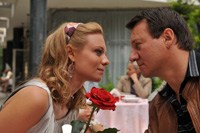By Joel Magalnick, Editor, JTNews
So many secrets, so little time. But in communist-era Poland, secrets are the currency of choice. Such is the case for Kamila, known to her handlers in the secret police as Little Rose, for whom this film is named, and she’s got more of these little nuggets of information than she can reasonably handle.
Let’s set the groundwork. It’s 1967. Israel has just surprised its neighbors in its victory over the weapons of war amassed at its borders. The Soviet government, with Poland in its orbit, has cut ties with Israel and a campaign of anti-Semitism has begun. In Warsaw, typist Kamila is in love. Her lover Roman Rozek exports goods onto the other side of the Iron Curtain — at least that what he’s told her. Adam Warczewski, an outspoken professor of literature at the university in Warsaw where she works, has drawn the interest of his government in part because he is Jewish.
Rozek, we quickly find out, is not who he says he is. Unbeknownst to anyone but us and his colleagues, he is a member of the secret police assigned to Adam to ensure that the professor’s Zionist tendencies, not that anyone has said he has any, do not interfere with his loyalties to Poland.
In actual footage from the era, the country’s leader, General Secretary Wladyslaw Gomulka, denounces Zionism as an enemy of Poland. Rozek, to justify his relationship with Kamila to his superiors — no one is immune to surveillance and they confront him about it — he decides he must use her to find out what Adam and his colleagues are up to in their supposed attempts to overthrow the state. As Lord John Emerich Edward Dalberg Acton of England said, “Power tends to corrupt, and absolute power corrupts absolutely.”
And so it begins.
The problem with Rozek’s plan is that as he puts it into play, he sends the lives of everyone he encounters into a downward spiral. Kamila’s love and trust in Rozek falters. She, after all, feels she has no choice in the matter and has no desire to hurt the man whose bed she has been sent into by her boyfriend. This angers Rozek, who becomes increasingly volatile. And Adam, despite his intellectual brilliance, is clueless to the betrayal by the woman he takes under his wing and with whom he begins to fall in love.
Jan Kidawa-Blonski has created a beautiful, suspenseful film, based on a true story, that nestles tightly into the political upheaval of the late 1960s. This was a time of black and white, which is how several scenes of the film fade in, only to be brought to color by the beauty of the red roses and the woman for whom they are intended.
In some ways it’s easy to see how living under this communist regime, especially if you were Jewish, could feel like a place where people felt trapped with nowhere to run. On the other, it was a reminder that even on that side of the curtain, the sun still shined and kids would frolic at the beach. The bright cinematography and seamless transitions between the actual government broadcasts and the story itself show the director’s expertise in telling the story. But Kidawa-Blonski doesn’t hesitate to remind us that life during that time could be harsh: When the state wanted to be brutal, it would be brutal, collateral damage be damned.
As the mess Rozek has created gets worse, his bright red roses become less a gift and more a calling card. Kamila and Adam fall in love, and because she has found that what Adam can teach her holds more value than her blind subservience to the state, their lives become a living hell. Yet Rozek’s own layers of secrets continue to peel back like a rotting onion, so much so that his stock in trade eventually becomes worthless. He, too, must pay a price. Nobody escapes unscathed, everything is irretrievably destroyed.
Everything, that is, except for the mastery of this film.
